- Home
- entertainment
- news
- Fact vs. fiction: The biggest myths and truths in the new Marilyn Monroe movie, 'Blonde'
Fact vs. fiction: The biggest myths and truths in the new Marilyn Monroe movie, 'Blonde'
Lloyd Lee

- "Blonde," a fictionalized account of Marilyn Monroe's life, is out now on Netflix.
- The movie is based on Joyce Carol Oates' novel of the same name.
Andrew Dominik's movie on the life of Marilyn Monroe, "Blonde," is based on Joyce Carol Oates' more-than 700-page novel of the same name.
The book, published in 2000, is a work of fiction, which Oates made explicitly clear in the introduction to her novel.
"'Blonde' is a radically distilled 'life' in the form of fiction, and, for all its length, synecdoche is the principle of appropriation," she wrote. "In place of numerous foster homes in which the child Norma Jeane lived, for instance 'Blonde' explores only one, and that fictitious; in place of numerous lovers, medical crises, abortions and suicide attempts and screen performances, 'Blonde' explores only a selected symbolic few."
Similarly, the movie focuses on select details and real tragedies from the iconic actor's life while blending in fictional accounts from existing lore out of Monroe's mythology and from Oates' and Dominik's imagination.
Here are some of the biggest facts and myths in "Blonde."
Who was Marilyn Monroe's father?
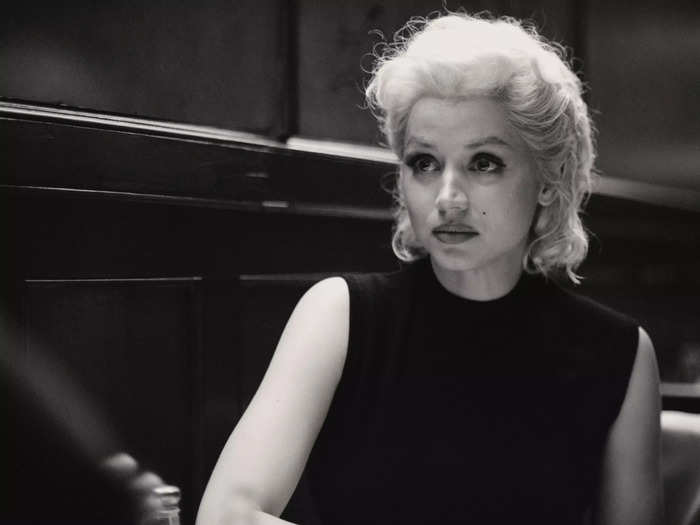
Dominik's film maintains a mystery around the identity of Monroe's biological father.
He's an unnamed voice in a series of mysterious letters to his daughter or a black-and-white image on the wall. In the movie, Monroe's mother refers to him as a "titan" of the acting industry, whom Monroe desperately hopes to meet.
Similarly, the real Monroe never met her real father, and his identity has always been the subject of speculation.
According to Inside Edition, Monroe believed that her father was Charles Stanley Gifford, who had a brief affair with her mother.
Monroe had made efforts to reach out to Gifford, according to Charles Casillo's biography "Marilyn Monroe: The Private Life of a Public Icon." But the man would deny the claim.
The closest to a confirmation that Gifford was Monroe's father was a documentary released this year, "Marilyn, Her Final Secret." Using a lock of Monroe's hair and a saliva sample from Gifford's great-grandchild, the documentary used DNA tests to conclude that Gifford was Monroe's long-lost father.
Was Marilyn Monroe abused as a child?
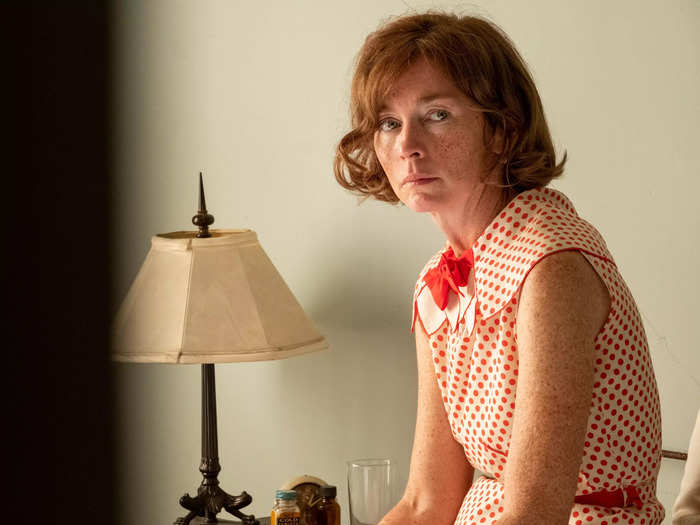
In "Blonde," Monroe's mother, Gladys Baker, attempts to drown Monroe in a scalding hot bathtub before her daughter escapes and their apartment burns down.
Baker would be submitted to a hospital and deemed unfit to care for Monroe.
In fact, Monroe's mother was diagnosed as schizophrenic and admitted to a psychiatric facility early in the actor's life, but there's no account of a drowning incident.
Her third husband, Arthur Miller, however, claimed that Monroe's mother tried to kill her daughter on three different occasions, according to Keith Badman's biography, "Marilyn Monroe: The Final Years."
Badman also wrote that Monroe's grandmother Della tried to smother her with a pillow for no apparent reason.
Monroe's childhood was unfortunately rife with abuse and she has spoken openly about it in interviews, according to Newsweek.
Was Marilyn Monroe an orphan?
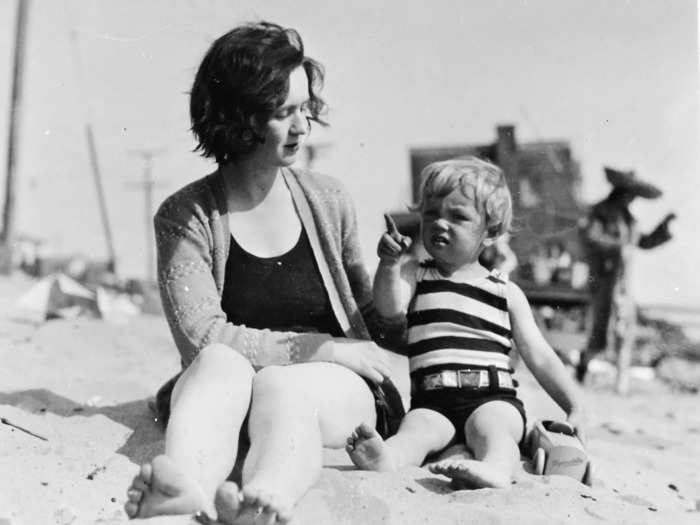
The film doesn't dwell too much on this aspect of Monroe's life. After her mother is submitted to a psychiatric facility, Monroe is dropped off at an orphanage by her neighbors, Jess Flynn (Sara Paxton) and Clive Pearce (Ryan Vincent).
It's true that Monroe was in an orphanage, but the actor also had a tumultuous childhood going in and out of various foster homes since her mother was institutionalized. Monroe was placed in at least 10 different foster homes, according to Newsweek.
She's also spoken about her experiences in foster homes in interviews.
"Some of my foster families used to send me to the movies to get me out of the house and there I'd sit all day and way into the night," she said in an interview with Life magazine. "Up in front, there with the screen so big, a little kid all alone, and I loved it."
How did Marilyn Monroe get her name?
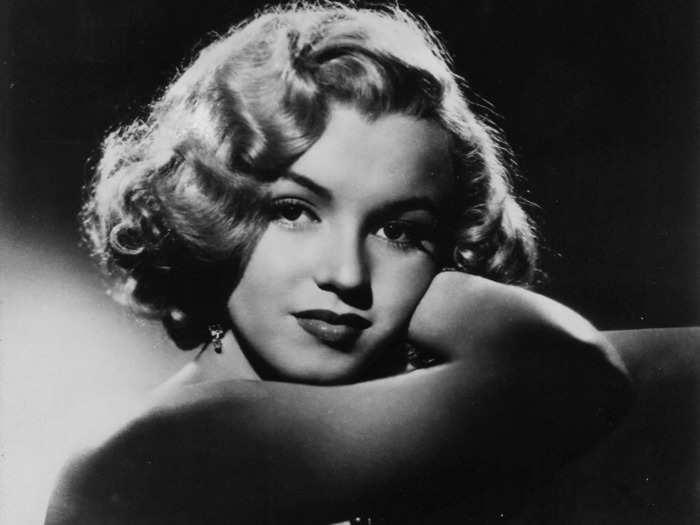
There's no mention of how Monroe got her iconic name in "Blonde," but it's a critical part of her metamorphosis.
As shown in the movie, Monroe's real name was Norma Jeane. Her birth certificate states her full name as Norma Jeane Mortensen, according to a 1981 New York Times article, before she was later baptized as Norma Jeane Baker.
She then changed her surname to Dougherty after her first marriage to James Doughtery at 16 years old.
Ben Lyon, a studio executive from 20th Century Fox, took issue with the last name because he felt people wouldn't be able to pronounce it properly, according to Daniel Spoto's "Marilyn Monroe: The Biography."
Multiple people contributed to the creation of her full stage name, but it was Lyon who came up with "Marilyn," Spoto wrote.
The studio executive took the name from Marilyn Miller, a Broadway musical actor. Miller and Lyon were rumored to be romantically involved, according to The Los Angeles Times.
Monroe was 20 years old at the time when she got her new name. It was just days before she signed her contract with 20th Century Fox on August 24, 1946. She legally changed her name to Marilyn Monroe almost a decade later.
Did Marilyn Monroe have to go through the casting couch process?
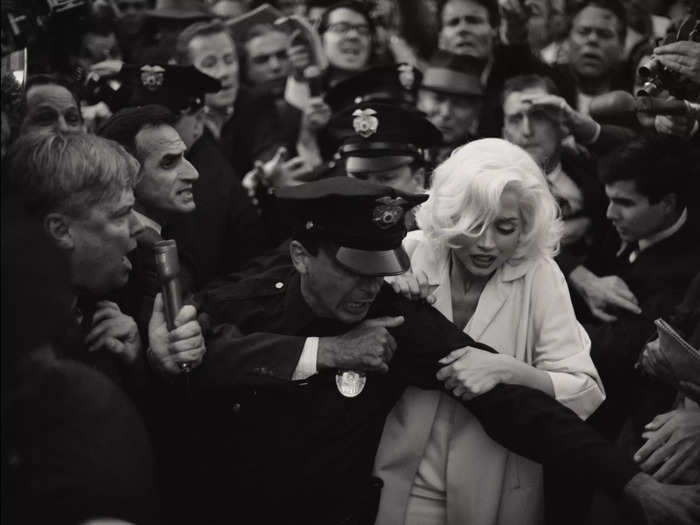
One of the more haunting moments in "Blonde" was when Monroe — still an aspiring actor — was raped by a studio executive named Mr. Z, during what she believed was an audition.
In Oates' version of the scene, Monroe thought she was auditioning for one of the actor's first small parts under 20th Century Fox, "Scuddda Hoo! Scudda Hay!"
Producers in Hollywood such as Darryl F. Zanuck, whom The New York Times critic Manohla Dargis writes is the character Mr. Z appears to be based on, were known to put actors through the casting couch, according to The Telegraph UK.
Monroe also said in interviews and in her unfinished autobiography, "My Story," that receiving unsolicited advances and harassment from men was a reality for starlets in Hollywood.
"You know that when a producer calls an actress into his office to discuss a script, that isn't all he has in mind," Monroe wrote in "My Story," according to Ozy. "I've slept with producers. I'd be a liar if I said I didn't."
Was Marilyn Monroe a good actress?
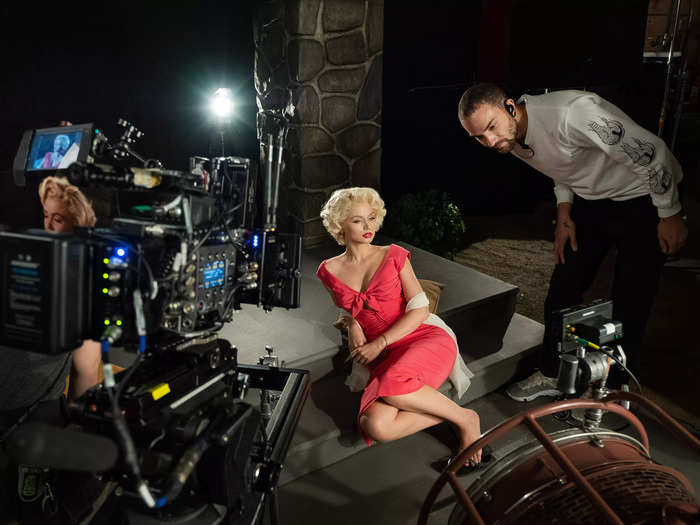
In the movie, Monroe is portrayed as an actor ridden with anxiety or on the verge of a breakdown whenever she's on the set. Part of the reason, the film suggests, is because Monroe was a perfectionist in her pursuit to embody the role she was playing.
There are testimonies that suggest some of this is true.
In an interview with The Los Angeles Times, Don Murray, Monroe's co-star in the 1956 film, "Bus Stop," said that Monroe was determined to prove she was a "serious actress," but she was also very nervous behind the camera and often several hours late to the set.
"That was very strange, that lack of discipline," he said.
Murray also recalled how she had trouble remembering her lines and sometimes broke out into a rash.
"I think it was a lack of confidence," he said. "For somebody who the camera loved, she was still terrified of going before the camera and broke out in a rash all over her body."
Other colleagues testified to Monroe's work ethic while also struggling on the set.
"I never saw anybody work so hard," Mitzi Gaynor, Monroe's co-star in "There's No Business Like Show Business," told The Times. "She did such a good job and personally, I think she stole the whole damn show. I just think she was thrown into a nest of vipers."
Did Marilyn Monroe have a polygamous relationship that included Charlie Chaplin's son?
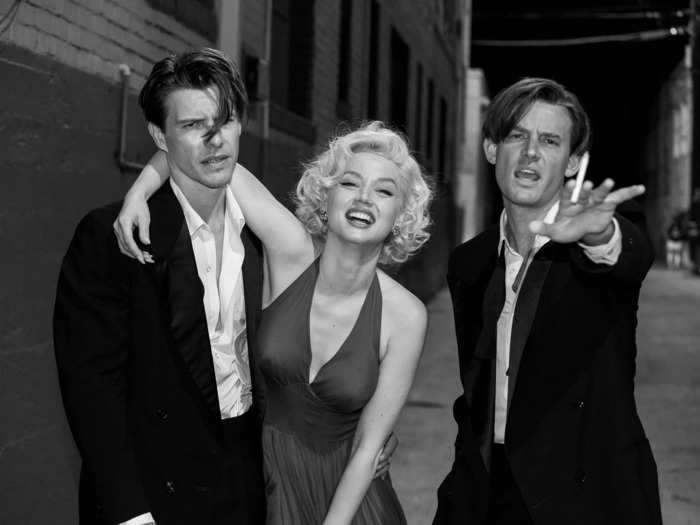
In "Blonde," Monroe is involved in a polygamous relationship with Edward G. Robinson Jr., son of actor Edward G. Robinson, and Cass Chaplin, Charlie Chaplin's son, played by Evan Williams and Xavier Samuel, respectively.
The amorous throuple dubbed themselves, "The Gemini," which would be the subject of tabloid fascination. Monroe also becomes pregnant with one of them.
There's no evidence that the actor was involved in a simultaneous relationship with the Chaplin and Robinson juniors. However, Cass Chaplin wrote about a brief relationship with Monroe in his 1960 memoir, "My Father Charlie Chaplin."
Did Marilyn Monroe have kids?
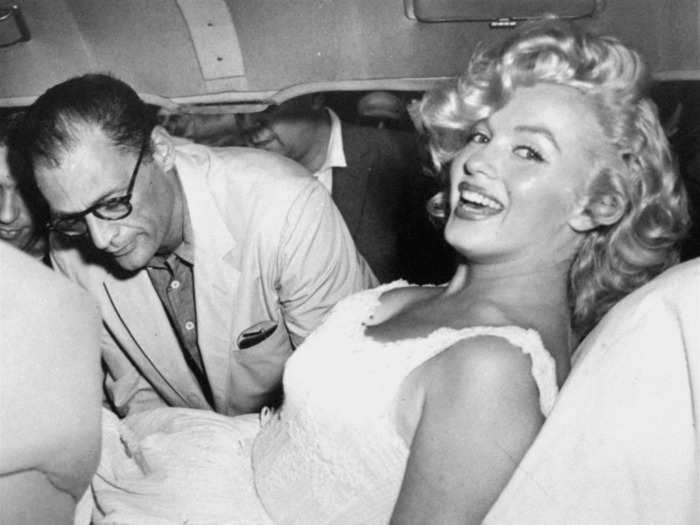
The movie shows a few dramatic scenes of Monroe going through an abortion and having a miscarriage. She also appears to have a deep desire to raise children.
There's little evidence that confirms Monroe had an abortion, although Oates' claimed in her introduction to her novel that Monroe went through several abortions.
But it's well known that she had two miscarriages and an ectopic pregnancy during her relationship with playwright Arthur Miller, according to Spoto's biography.
The real Monroe also wanted children.
In the Netflix documentary, "The Mystery of Marilyn Monroe: The Unheard Tapes," Milton Greene, a photographer who was a close friend and associate, said that Monroe always talked about having kids.
"She wanted a baby. In fact during [the shooting of] 'Prince and the Showgirl' (1957), she said when it's over, she's gonna go home and have a baby," Greene said. "If you gave her a choice between children and stardom, it would have been children without question."
Monroe did not have any children before her death in 1962.
Was Marilyn Monroe married to Joe DiMaggio?
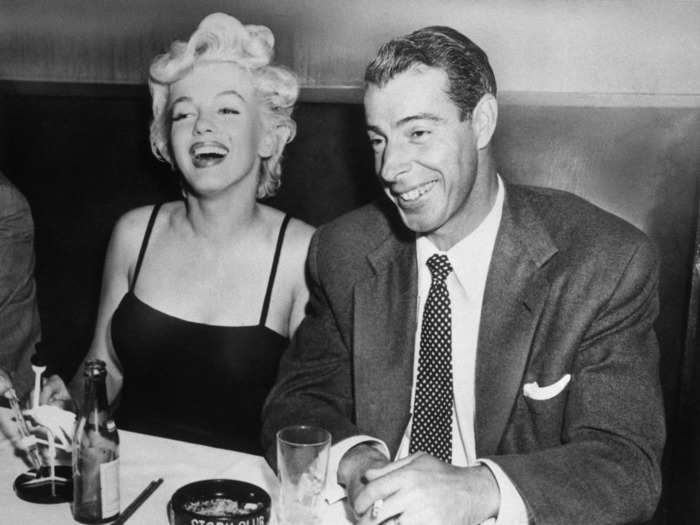
"Blonde" doesn't name the character Monroe marries, who is played by Bobby Cannavale, and Netflix only credits him as The Ex-Athlete, just as in Oates' novel.
But the character could be a reference to Monroe's brief and abusive relationship with New York Yankees legend Joe DiMaggio.
The two married in 1954 and divorced nine months later, according to Life magazine.
What's also accurately depicted in the movie was DiMaggio's disdain for Monroe's Hollywood career. According to PBS, DiMaggio wanted Monroe to be a homemaker.
In the iconic moment when Monroe is photographed over a New York City subway grate during the shooting of "The Seven Year Itch" (1957), DiMaggio was in the audience watching, disgusted, according to PBS, which also reported that the couple fought and DiMaggio got physical. Monroe filed for a divorce, citing "mental cruelty," according to PBS.
What was Marilyn Monroe's relationship with JFK?
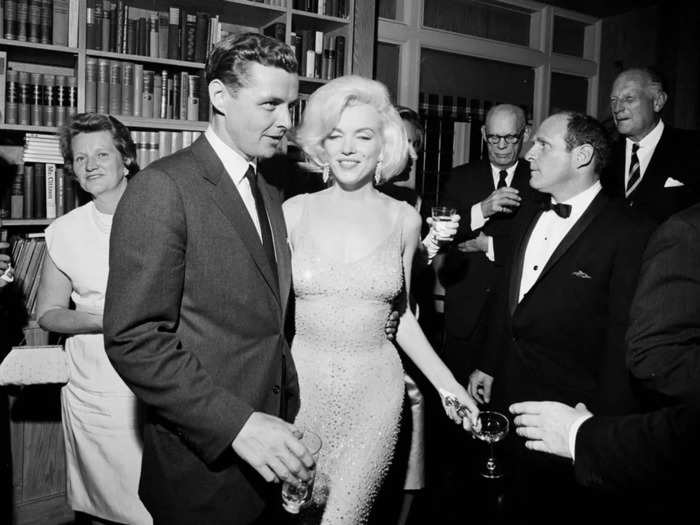
In the film, Monroe is aggressively escorted by two Secret Service agents to the sleeping quarters of an unnamed president. He then forces a noticeably drugged Monroe to perform oral sex.
As far as public knowledge goes, this meeting is fictionalized. But there was a lot of speculation about the relationship between Monroe and John F. Kennedy. If there's an inkling of truth to any of the rumors, then they were all private given Kennedy's position and his marriage to Jackie Kennedy.
One biographer claimed that Monroe first met Kennedy in 1954 and the president later introduced the actor to his brother Robert Kennedy in 1962 — the year Monroe died.
In other accounts of the president and the actor's relationship, Spoto and other biographers wrote that Kennedy and Monroe spent a night together in Palm Springs, California, at singer Bing Crosby's home.
Rumors of an affair would be further enflamed when Monroe sang her famously sultry rendition of "Happy Birthday" to Kennedy at Madison Square Garden.
Was Marilyn Monroe married to Arthur Miller?
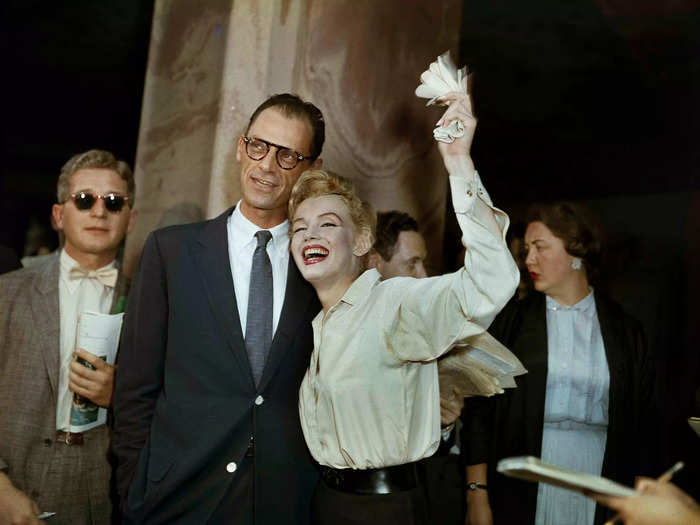
Yes, Monroe was married to the "Death of a Salesman" playwright. The two first met in 1951 and married on June 29, 1956, according to Life.
"Blonde" also provides a fictionalized account of one of Monroe's miscarriages during their relationship, when she trips and falls on her stomach at the beach. There's no evidence that this happened.
The failed pregnancies were a great source of stress on the couple's relationship, along with accounts of affairs committed by both parties.
The two divorced in 1961.
How did Marilyn Monroe die?
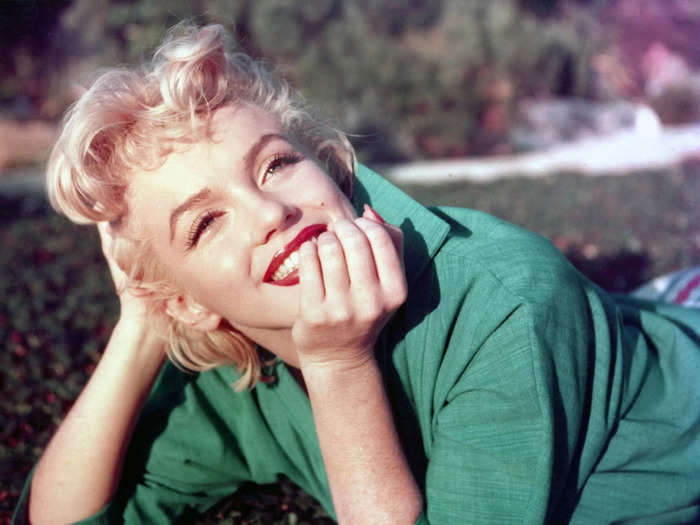
In the final moments of "Blonde," Monroe is seen drinking heavily and abusing barbiturates before she died in her home with a telephone receiver in her hand.
Numerous articles from the day of her untimely death confirm that Monroe died in her Brentwood, California, home with a bottle of sleeping pills beside her. Her death was ruled a barbiturate overdose.
A Los Angeles Times and Variety article also reported that police found her with a telephone receiver in her hand, in an apparent attempt to call someone. The Associated Press later reported in 1985 that Peter Lawford, Kennedy's brother-in-law, may have been the last person to talk to the actress.
Still, there were a lot of conspiracy theories revolving around Monroe's death, particularly whether it was a suicide or murder — so much so that the Los Angeles County district attorney reopened the case in 1982, according to The LA Times.
Monroe died on August 4, 1962. She was 36 years old.
Popular Right Now
Popular Keywords
Advertisement